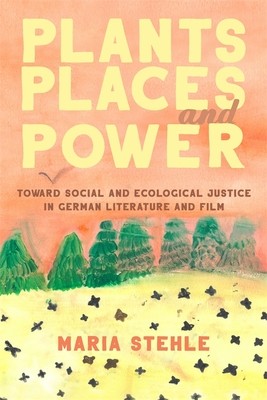
- We will send in 10–14 business days.
- Author: Maria Stehle
- Publisher: Camden House (NY)
- ISBN-10: 1640141251
- ISBN-13: 9781640141254
- Format: 15.2 x 22.9 x 1.3 cm, kieti viršeliai
- Language: English
- SAVE -10% with code: EXTRA
Reviews
Description
Examines portrayals of plants and landscapes in recent German novels and films, addressing the contemporary forms of racism, nationalism, and social and ecological injustice that they expose.
Plants, Places, and Power is a study of plants and landscapes in and beyond contemporary German-language literature and film. Stories and images of plants and landscapes in cultural productions are key sites for exposing the violent legacies of German colonialism and Nazism and for addressing contemporary forms of racism, nationalism, social and ecological injustice, and gender inequity. The novels and films discussed in this book address these key political issues in contemporary Europe and propose alternative ways for people to live together on this planet by formulating more inclusive and sustainable concepts of belonging.The book has two main objectives: to offer new approaches to contemporary literature and film from an intersectional, ecological perspective, and to form a canon. All of the works focused on, from Mo Asumang's documentary film Roots Germania (2007) through Faraz Shariat's Futur Drei (2020) and from Yōko Tawada's novel Das nackte Auge (2004) to Sasa Stanisic's Herkunft (2019), are by female artists, artists of color, artists who have experienced forced displacement, and/or queer artists. In five chapters, Maria Stehle reads artworks in reference to ecological systems, develops forms of eco- and social criticism based on art, and intertwines ecological and critical thinking with questions of form, affect, and aesthetics.
EXTRA 10 % discount with code: EXTRA
The promotion ends in 22d.01:54:29
The discount code is valid when purchasing from 10 €. Discounts do not stack.
- Author: Maria Stehle
- Publisher: Camden House (NY)
- ISBN-10: 1640141251
- ISBN-13: 9781640141254
- Format: 15.2 x 22.9 x 1.3 cm, kieti viršeliai
- Language: English English
Examines portrayals of plants and landscapes in recent German novels and films, addressing the contemporary forms of racism, nationalism, and social and ecological injustice that they expose.
Plants, Places, and Power is a study of plants and landscapes in and beyond contemporary German-language literature and film. Stories and images of plants and landscapes in cultural productions are key sites for exposing the violent legacies of German colonialism and Nazism and for addressing contemporary forms of racism, nationalism, social and ecological injustice, and gender inequity. The novels and films discussed in this book address these key political issues in contemporary Europe and propose alternative ways for people to live together on this planet by formulating more inclusive and sustainable concepts of belonging.The book has two main objectives: to offer new approaches to contemporary literature and film from an intersectional, ecological perspective, and to form a canon. All of the works focused on, from Mo Asumang's documentary film Roots Germania (2007) through Faraz Shariat's Futur Drei (2020) and from Yōko Tawada's novel Das nackte Auge (2004) to Sasa Stanisic's Herkunft (2019), are by female artists, artists of color, artists who have experienced forced displacement, and/or queer artists. In five chapters, Maria Stehle reads artworks in reference to ecological systems, develops forms of eco- and social criticism based on art, and intertwines ecological and critical thinking with questions of form, affect, and aesthetics.


Reviews